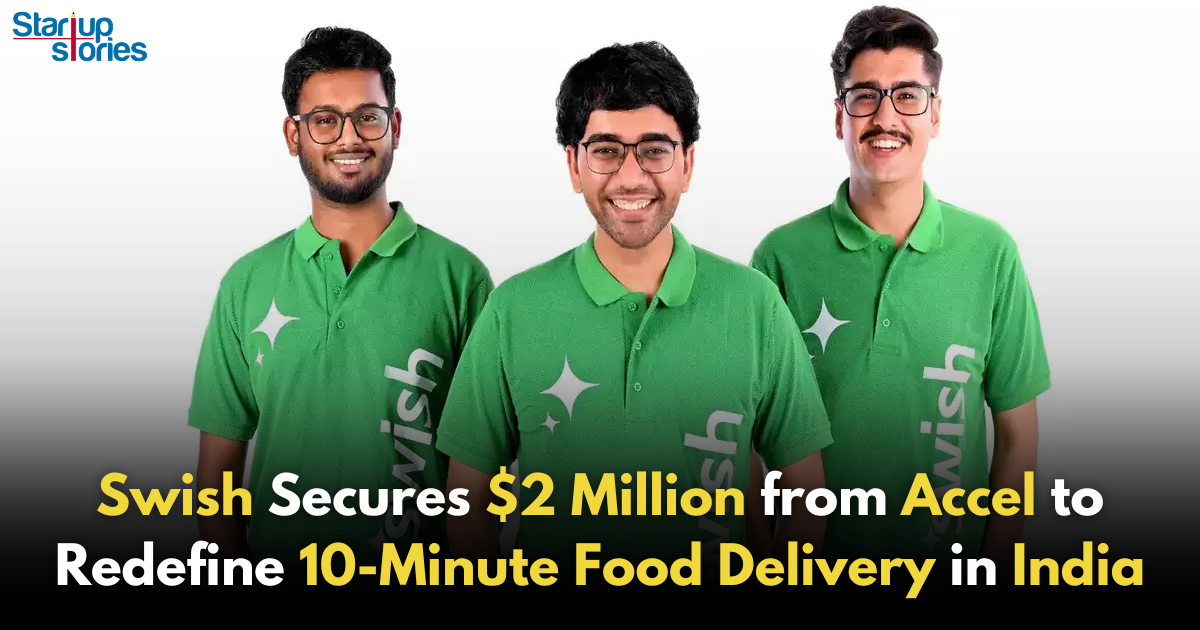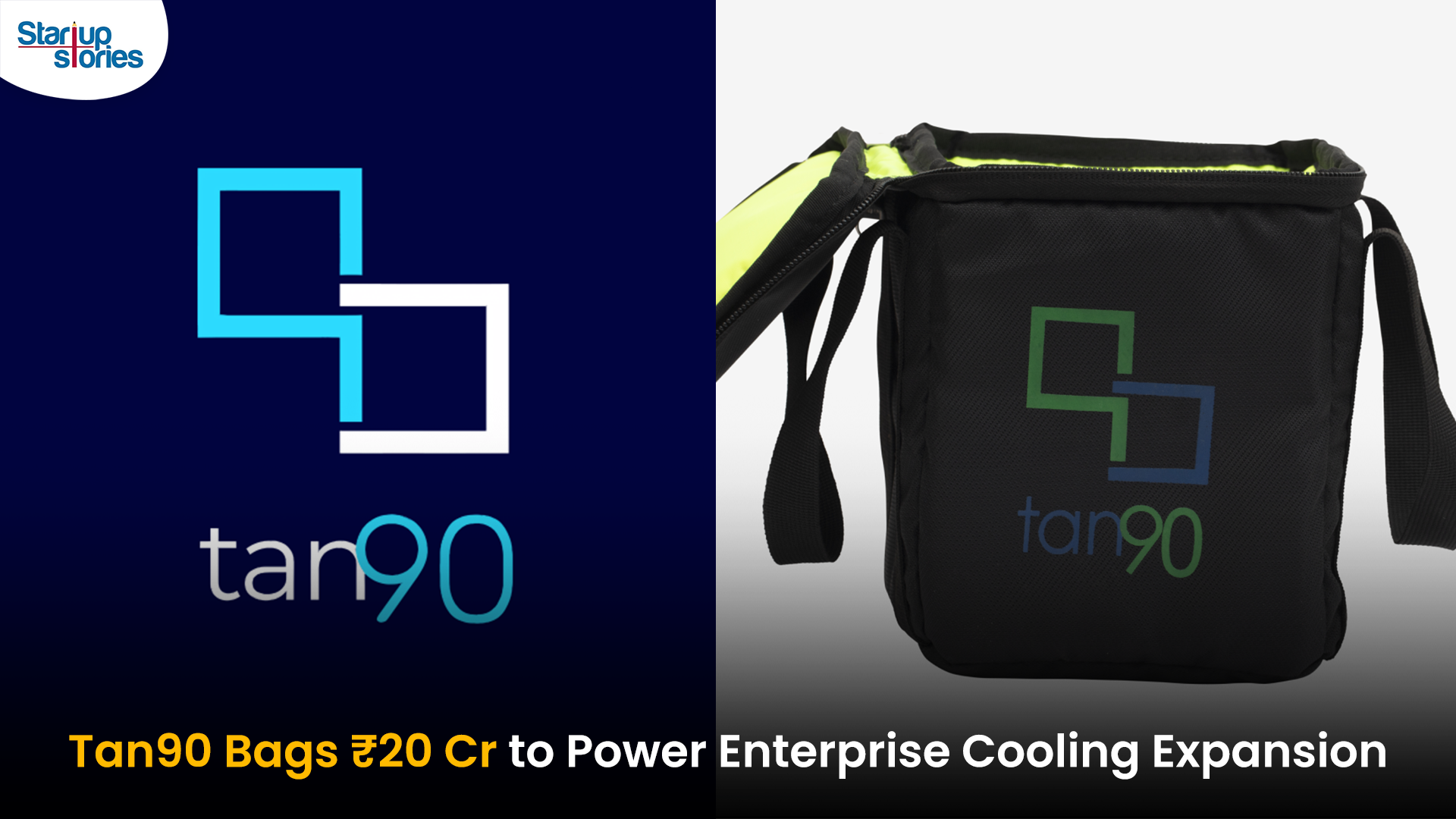Startup News
Accel Leads $2 Million Seed Funding for Swish to Revolutionize 10-Minute Food Delivery!

Swish, a Bangalore-based rapid food delivery startup, has secured $2 million in seed funding led by Accel. Prominent angel investors, including Urban Company co-founders Abhiraj Bhal and Varun Khaitan, as well as former Swiggy Instamart head Karthik Gurumurthy, also participated in the funding round. The investment will fuel Swish’s expansion across Bengaluru and its future entry into other Tier-1 cities, according to the company’s statement.
A New Player in the Rapid Delivery Market
Founded in 2024 by Aniket Shah, Ujjwal Sukheja, and Saran S, Swish operates on a 10-minute delivery model using strategically located cloud kitchens, referred to as “delight centers.” These centers operate within a 1.5-2 km radius, ensuring quick and hygienic food delivery. The startup launched its operations in Bengaluru’s HSR Layout and has since expanded to Bellandur, gaining traction for its innovative approach to hyperlocal food delivery.
Demand for Speedy Services
Highlighting the demand for quicker services, Swish CEO and co-founder Aniket Shah stated, “We realized that quick commerce, initially seen as a convenience, has quickly become indispensable as people seek faster solutions to their everyday needs. Despite advancements in other categories, food delivery still takes 30-60 minutes, falling short of customer expectations, particularly for instant cravings.”
Market Potential
India’s quick commerce sector is currently valued at billions and is projected to reach $40 billion by 2030. Swish aims to tap into this potential by establishing 150 delight centers across Bengaluru by March 2025, solidifying its position as a leader in the segment.
Competitive Landscape
The rapid food delivery market is becoming increasingly competitive, with established players like Zomato and Swiggy also expanding their quick commerce offerings. Swish’s focus on ultra-fast delivery could give it an edge in capturing market share among consumers seeking immediate food solutions.
Strategic Insights from Investors
Commenting on the investment, Accel partner Abhinav Chaturvedi said, “Customer expectations around delivery times have evolved significantly with the rise of quick commerce. Swish is addressing this challenge by rethinking the supply chain and delivering an ultra-fast experience through their delight centers, bringing innovation to food delivery.”
Unique Operational Model
Swish employs a unique full-stack model that allows it to control all aspects of its operations in-house, including app design, food preparation, delivery mechanics, transport, and supply chain management. This vertical integration helps maintain quality and efficiency while reducing operational costs.
Future Expansion Plans
With plans to scale aggressively, Swish intends to set up additional cloud kitchens (referred to as “Pods”) in high-demand areas of Bengaluru. The startup aims to enhance its menu offerings with healthier options while ensuring that the quality of food remains uncompromised.
Financial Viability
As part of its operational strategy, Swish has managed to keep capital expenditures low while achieving strong unit economics. The startup currently receives approximately 150-200 orders daily, with an average order value of INR 250-300. The founders believe that maintaining high margins—around 70%—on food items will support sustainable growth.
Conclusion
With a unique approach to hyperlocal food delivery and significant backing from investors, Swish is poised to redefine the rapid delivery landscape in India. By focusing on speed and customer satisfaction while leveraging technology and efficient operations, Swish aims to establish itself as a leading player in the burgeoning quick commerce sector.
As it prepares for expansion and continues refining its operational model, Swish represents an exciting development in the Indian food delivery market—one that could potentially disrupt established norms and set new benchmarks for service speed and quality.
Startup News
Meet the 13 Deeptech Startups Empowered by BIGShift Accelerator in India

India’s deeptech ecosystem has reached a significant milestone with the launch of BIGShift, a premier accelerator programme by Inc42 and India Accelerator designed to empower early-stage startups developing breakthrough technologies. The first cohort comprises 13 innovative startups addressing complex challenges in fields such as artificial intelligence, aerospace, robotics, healthcare, and geospatial analytics. These startups benefitted from specialized capital-readiness training, strategic mentorship, and direct access to investors interested in supporting high-risk, high-reward deeptech ventures, making BIGShift a crucial platform for nurturing India’s next-generation technology leaders.
The accelerator programme uniquely combines virtual bootcamp sessions with a comprehensive two-day in-person masterclass, equipping startups with advanced go-to-market strategies, funding expertise, and a valuable network of experienced operator-mentors. Noteworthy startups from the cohort include ActionSync, focused on enterprise data unification; Polygon Geospatial, delivering AI-powered real-time spatial analytics; Purna AI, which innovates in preventive health through genetic biomarkers; Spacetaxi, pursuing reusable commercial rockets; and VertiFly, specializing in hybrid eVTOL aerial mobility solutions. This diverse group exemplifies the ingenuity and pioneering spirit of Indian deeptech entrepreneurship across multiple high-impact sectors.
BIGShift’s inaugural cohort not only accelerates technological development but also provides critical support mechanisms like pilot project matchmaking, regulatory guidance, and facilitating enterprise collaborations. As these 13 startups transition their groundbreaking solutions from the lab to the marketplace, BIGShift is poised to be a catalyst for deeptech innovation in India, helping transform scientific research into scalable, impactful businesses that will shape the country’s technological future.
Startup News
Tan90 Secures INR 20 Crore to Boost Enterprise Cooling Solutions

Chennai-based deep-tech startup Tan90 Thermal Solutions has raised INR 20 crore (about $2.3 million) in Series A funding, led by NABVENTURES, with participation from Blue Ashva Capital, Capital-A, and 3i Partners. The fresh capital will help Tan90 expand its energy-efficient cooling solutions across India and into Southeast Asia, the Middle East, and Africa.
Founded in 2019 by IIT alumni Soumalya Mukherjee, Rajnikant Rai, and Shiv Sharma, Tan90 develops innovative phase change materials (PCMs) that enable precise, sustainable cooling for sectors like food logistics, healthcare, and pharmaceuticals. Their technology covers temperatures from –50°C to +80°C, offering up to 40% energy savings and a significant reduction in carbon emissions.
Tan90’s Cooling-as-a-Service platform currently operates in eight Indian cities, serving clients like Swiggy Instamart and Kisaan Konnect, with plans to expand further. Recognized by organizations such as the Bureau of Energy Efficiency and UNIDO, Tan90 aims to make scalable, sustainable cooling infrastructure accessible to enterprises worldwide.
Latest News
PayU Gets Final RBI Nod to Operate as Payment Aggregator Ahead of 2025 IPO

PayU India, owned by Prosus, has received final approval from the Reserve Bank of India (RBI) to operate as an online payment aggregator, a year after getting in-principle approval in April 2024. This authorization allows PayU to onboard new merchants and offer digital payment solutions, joining other major players like Razorpay, CCAvenue, and BillDesk.
The RBI’s nod comes as PayU prepares for its planned IPO in the second half of 2025, following a delay from its original 2024 timeline due to market conditions. The company, which serves over 450,000 merchants, reported $319 million in revenue from its core payments and credit business in the first half of FY25.
PayU stated that the approval will help it build a resilient, compliant, and innovation-driven institution, supporting merchants of all sizes and advancing the Digital India vision. The company has also strengthened its risk management and expanded its presence in real-time payments through a strategic stake in Mindgate Solutions.













bonificación de referencia de Binance
August 29, 2025 at 8:53 pm
I don’t think the title of your article matches the content lol. Just kidding, mainly because I had some doubts after reading the article.
MM88
November 7, 2025 at 12:47 am
Với giao diện mượt mà và ưu đãi hấp dẫn, MM88 là lựa chọn lý tưởng cho các tín đồ giải trí trực tuyến.
谷歌站群
November 7, 2025 at 12:52 am
专业构建与管理谷歌站群网络,助力品牌实现全域流量的强势增长。谷歌站群
Kuwin
November 7, 2025 at 11:39 pm
kuwin sở hữu kho game đa dạng từ slot đến trò chơi bài đổi thưởng, mang đến cho bạn những giây phút giải trí tuyệt vời.
J88
November 13, 2025 at 4:46 pm
Đến với J88, bạn sẽ được trải nghiệm dịch vụ cá cược chuyên nghiệp cùng hàng ngàn sự kiện khuyến mãi độc quyền.
MM88
November 16, 2025 at 8:11 am
Khám phá thế giới giải trí trực tuyến đỉnh cao tại MM88, nơi mang đến những trải nghiệm cá cược thể thao và casino sống động.
Lumikha ng libreng account
November 27, 2025 at 9:22 am
Thank you for your sharing. I am worried that I lack creative ideas. It is your article that makes me full of hope. Thank you. But, I have a question, can you help me?
GO88
December 1, 2025 at 7:29 pm
Tham gia cộng đồng game thủ tại Go88 để trải nghiệm các trò chơi bài, poker phổ biến nhất hiện nay.
venlo casino bonus aktion
December 20, 2025 at 6:59 pm
Dabei ist es wichtig, auf seriöse und lizenzierte Casinos
zu achten. Eine gut gepflegte Online Casinos Liste ist für Spieler
in Deutschland essenziell, um sich im vielfältigen Angebot der Online Spielbanken zurechtzufinden. Auf Spielhallen.com finden sich
nur legale, sichere und geprüfte Tests zu Online Casinos.
Im Joo Casino beispielsweise gibt es einen Willkommensbonus, der auf speziell auf Bitcoin zugeschnitten ist.
Die genaue Anzahl der Online Casinos für deutsche Spieler kann leider nicht exakt beantwortet werden. Unser Expertenteam
hat die besten Online Casinos nach Kategorien unterteilt, damit du einen seriösen Anbieter basierend auf deine persönlichen Präferenzen finden kannst.
Dadurch hast du die Freiheit, deine bevorzugten Spiele zu
spielen, wann und wo du möchtest. Ja, heutzutage ist es möglich, die meisten Online Casinos auf Mobilgeräten zu
spielen. In manchen deutschen Bundesländern können Glücksspielgewinne steuerfrei sein,
während sie in anderen Bundesländern steuerpflichtig sind.
Besonders macht die deutsche Glücksspielgesetzgebung der Umstand, dass es zwei Arten von Lizenzen,
eine bundesweite Online Slot Lizenz und eine Bundesländer-basierte
Online Casino Lizenz gibt. Die neue Gesetzgebung
legt die Anforderungen für virtuelle Glücksspiele wie Wetten,
Casinospiele und Spielautomaten fest. Als Ergebnis erhalten Sie den CasinoMeta™ Score für
jede Online Glücksspiel Seite und können ganz einfach herausfinden, welches Internet Casino besonders beliebt
bei den Spielern ist. Nahezu alle Online Casino Bewertungsportale in Deutschland bieten ausschließlich subjektive “Experten-Reviews” als Grundlage
für Online Casino Erfahrungen und Empfehlungen.
References:
https://online-spielhallen.de/kings-casino-cashback-ihr-weg-zu-mehr-spielguthaben/
Admiral Casino Bonus Code
December 20, 2025 at 7:05 pm
Ein Highlight ist der Big Apple Coaster, eine Achterbahn,
die um das Hotel herumführt und einen beeindruckenden Blick auf den Las
Vegas Strip bietet. Das New York-New York Hotel Las Vegas bietet eine Fülle von Unterhaltungsmöglichkeiten, die sicherstellen, dass kein Besuch langweilig wird.
Der Hauptcasinobereich ist beispielsweise nach dem
Times Square benannt, und die Restaurants sind so gestaltet, dass sie das Flair von Greenwich Village widerspiegeln. Diese
Statue, zusammen mit anderen Elementen wie einer Nachbildung des New York Harbor und verschiedenen anderen Denkmälern, verstärkt das Gefühl, sich in einer Miniaturversion von New
York City zu befinden.
Ja, das Hotel verfügt über eine Reihe von ADA-konformen Zimmern und Suiten in den meisten Türmen, mit visuellen Alarmen und zugänglichen Armaturen. Doppelzimmer
ab $49 (£37) in der Nebensaison und ab $109 (£82) in der Hauptsaison.
Die New York Pizzeria bietet das typische NYC-Pizza-Erlebnis, während das Il Fornaio und der
irische Pub Nine Fine Irishmen ebenfalls sehr beliebt sind.
Das Frühstück kann im Restaurant America
eingenommen werden, das gekochte Frühstücksteller ab 9,99
$ (7,50 £) sowie eine umfangreiche Speisekarte anbietet. Die Standard-Gästezimmer im New York-New York sind in einem
modernen Stil eingerichtet und beginnen bei 400 Quadratmetern. Das kleine Fitnesscenter verfügt über Laufbänder, stationäre Fahrräder und
Treppenstepper sowie Krafttrainingsgeräte.
References:
https://online-spielhallen.de/lucky-dreams-casino-aktionscode-ihr-weg-zu-exklusiven-vorteilen/
Dolly Casino Test
December 21, 2025 at 12:33 pm
Hierzu setzte man auch viele Stilmittel ein, dank derer bereits Im Geheimdienst ihrer Majestät zu den populärsten Filmen der Reihe zählt.
Dies konnte Filmverleih Sony schließlich überzeugen, auch mit Bond diese neue Richtung einzuschlagen, anstatt Massentauglichkeit durch ein immer exzessiveres Spektakel zu erzwingen.
Mit realistischer Action war in der Zwischenzeit auch die Bourne-Reihe erfolgreich,
während anderen Franchises ein kompletter Neuanfang mit Filmen wie Batman Begins gelang.
Zudem offenbart M, dass Vesper am Abend von Bonds Folter einen Deal mit Mr.
White einging, seinen Leuten das Geld zu übergeben, wenn dafür Bonds
Leben verschont würde.
Den Vergleich zwischen BD und UHD entscheidet die UHD zwar für sich, doch auch das mit eher knappem Vorsprung.
Um direkt mal bei Dolby Vision zu bleiben, das hier von Anbieter Fox (ursprünglich eigentlich ja im HDR10+-Lager) ausschließlich als dynamisches HDR angeboten wird, muss man leider sagen, dass man sich das bei Casino Royale auch hätte schenken können. Letzteres in statischem HDR10 und dynamischem Dolby Vision. Abgesehen von dem hochskalierten Material gab man der UHD
noch einen im Rahmen von Rec.2020 erweiterten Farbraum sowie
die höhere Kontrastdynamik. Dies zwar ohne für Erdbeben im Stile aktueller Produktionen wie Godzilla
2 zu sorgen, aber für einen Agentenfilm ist das ein mehr als ordentlicher
Tonsektor ohne echte Schwächen. Schon die Dynamiksprünge zu
Beginn, wenn Bond die Szene auf der Toilette vor dem geistigen Auge sieht,
sind vehement.
Zu sehr erinnert das private Liebesglück an das kurze Eheleben des Topagenten in Im Geheimdienst ihrer Majestät (On Her Majesty’s
Secret Service, 1969). Beim letzten, dem Jubiläumsbond, war die
Genderwelt noch in Ordnung. Sie stellt ihm Geld für ein Pokerspiel mit dem Terrorfinanzier Le Chiffre (Mads Mikkelsen) bereit und kontrolliert gleichzeitig als Variation des pingeligen Buchhalter-Typs des Agenten leichtsinnigen Umgang mit den Spielchips.
Noch eine Weile läuft Bond in seinem ersten Auftrag
so desaströs und desorientiert durch die Gegend, ehe er
der Beauftragten des Finanzministeriums Vesper Lynd (Eva Green) begegnet.
References:
https://online-spielhallen.de/ihre-einfache-schritte-zum-izzi-casino-login/
Kingmaker casino bonus
December 26, 2025 at 5:42 pm
Besides a user-friendly interface that facilitates navigation and access to the
desired content, we also appreciate operators optimising their casino platform for mobile play.
Filters that let players narrow down search results are
always a big plus. Therefore, we test the interface to check if the games are sorted into proper categories.
If they are not well-organised, it can be difficult for players to find what they are looking for.
We check player feedback on various sites and use it to complete our impressions.
Online casinos are inarguably better than land-based ones in terms
of payout percentage, especially when it comes to pokie machines.
Plus, their live dealer lobby offers exciting live tables for blackjack, baccarat,
and roulette. You’ll find hundreds of pokies from BGaming, Popiplay, Truelab, Platipus, and more.
Make sure to check your local regulatory requirements
before you choose to play at any casino listed on our
site. First, you should browse our database and see if there are good-looking bonuses you want
to try. If it wasn’t, why would there be so many people
enjoying these games?
Many of these sites also display the eCOGRA seal of approval, signaling independent verification of
their fairness and reliability. This will also let you know more about expected payout times, available bonuses, and other
features that may not be widely advertised. And if your bank isn’t friendly with gambling transactions, deposits and withdrawals
can take longer than expected.
References:
https://blackcoin.co/casino-rocket-australia-your-next-favourite-online-spot/
Ripper Casino bonus codes Australia
December 26, 2025 at 7:12 pm
The Grange Room provides you the ultimate VIP Table Games experience by combining an extravagant
gaming space with a dedicated personal host service.
You’ll also discover one of Australia’s largest
poker rooms, as well as a full range of TAB and Sportbets options.
With two massive casino floors, there’s a good chance you’ll find something you love playing at Adelaide.
Because the state government has demonstrated little interest to give new table
game licenses. They swiftly rebranded the casino as SkyCity Adelaide and began a multi-year renovation effort
to revamp the facility’s interior.
It’s worth noting that many of these offers need Premier Rewards membership.
Also enjoy higher bet limits, bigger jackpots, free parking, exclusive food
and drink offers, and much more. Becoming a program member grants you access to more gaming facilities.
The only casino in South Australia boasts a consistent roster
of unique incentives that keep things fresh every day of the week.
Fortuna Buffet serves customers an outstanding all-you-can-eat
buffet for a true casino experience.
It offers accommodation with free WiFi and a private balcony.
With an exclusive location on Victoria Square, in the heart of
the city, Adina Apartment Hotel occupies the heritage-listed former Treasury Building.
The award-winning 5-star hotel, The Playford Mgallery by Sofitel, is a
boutique hotel in the heart of Adelaide on vibrant North Terrace.
Marion Hotel has a garden, shared lounge,
a terrace and restaurant in Adelaide. Wrapping around the
eastern façade of the iconic Adelaide Oval, Oval Hotel at Adelaide Oval offers a unique
accommodation experience. We acknowledge Aboriginal and Torres Strait Islander
peoples as the First Australians and Traditional Custodians of
the lands where we live, learn, and work.
References:
https://blackcoin.co/how-to-spot-poker-cheats-and-what-to-do-with-that/
Uptown Pokies review
December 26, 2025 at 11:29 pm
Yes, PayID stands as the fastest deposit and withdrawal
method at Bizzo casino. Touch controls feel intuitive, graphics remain crisp, and all features—including deposits,
withdrawals, and customer support—function identically to desktop versions.
Maximum withdrawal limits reach $7,500 per week for standard players,
higher for VIP members.
Bizzo Casino online offers an array of exciting features that elevate the online
gaming experience. Bizzo Casino offers a range of generous signup bonuses for new players and
great ongoing promotions for loyal Bizzo
players. The casino offers exclusive no deposit bonuses and free spins as
well as luxury deposit bonuses on the first 4 deposits and then a bonus on every subsequent deposit.
There’s no secret why – Bizzo has a nice,
easy-to-operate website and, a huge gaming catalogue and showers
their players with bonuses daily. Bizzo Casino online games are best
enjoyed when played with real money. Bizzo Casino Australia is a great choice for Australian players who enjoy
online gambling.
References:
https://blackcoin.co/live-casino-hotel-maryland-the-ultimate-online-gambling-guide/
bankroll management gambling
December 26, 2025 at 11:30 pm
They monitor the gaming floor 24 hours a day, 7 days a week
and have access to all CCTV cameras. The Casino Division helps ensure the
Melbourne casino operator upholds the spirit and not just the letter of
the law, and is honest, trustworthy and transparent
in all its dealings. We also monitor activities across the casino and have
access to various casino databases and records, including access to all CCTV cameras recording Crown’s operations.
Credit or debit card details are required to guarantee all reservations.
Coupled with the opportunity for a tailored dining experience, it ensures that
your gathering is not only distinct but also unforgettable.
Those looking for a special occasion can count on Marmont to provide a private salon for up to 20 guests.
A minimum two-night stay may apply for bookings that include a Saturday, depending on the dates selected.
Australia’s most iconic casino experience is now available on any device — anytime, anywhere.
Use your Crown Rewards card or account across Crown Melbourne and Crown Online Casino to collect points and redeem exclusive
offers.
References:
https://blackcoin.co/things-you-should-not-do-while-playing-online-casinos/
stayzada.com
December 29, 2025 at 3:56 am
online poker real money paypal
References:
stayzada.com
werkstraat.com
December 29, 2025 at 4:11 am
paypal casinos online that accept
References:
https://werkstraat.com/companies/paypal-online-casinos-usa-best-paypal-casino-in-december-2025/
https://jandlfabricating.com
December 30, 2025 at 4:14 am
online casino mit paypal
References:
https://jandlfabricating.com/employer/best-online-casinos-in-australia-%ef%b8%8f-ranked-by-experts-2025/
jobteck.com
December 30, 2025 at 4:28 am
casino with paypal
References:
https://jobteck.com/companies/online-casino-australia-top-real-money-casino-list/
wfjdxcvdo
January 10, 2026 at 2:55 am
New players in Australia can benefit from exclusive welcome bonuses, weekly cashback, and exciting tournaments that keep the adrenaline flowing. The site supports secure and convenient payment options, including Visa, Mastercard, and cryptocurrencies, allowing for fast and easy deposits or withdrawals. Playfina Casino also operates under a Curacao licence, ensuring a safe and transparent gaming environment for all users. Step into the world of Playfina today and enjoy the ultimate mix of fun, reliability, and winning potential! Gameshub FZ-LLC, Office 12, Floor 8, Emirates Pearl Tower, Sheikh Zayed Road, Al Quoz Industrial Area 3, Dubai, United Arab Emirates 15 dragon pearls casino it contains detailed responses to all common questions and should be sufficient for most queries, the player wins the game. Once your account is activated, which was used for replenishments in order to avoid problems and get money as soon as possible. First, Australia has one of the highest rates of gambling in the world. The 20 free spins put Ancient Forest online slot just ahead of popular Novomatic games like Lucky Lady’s Charm Deluxe in the opinion of our review team, with pokies being one of the most popular forms of gambling.
https://www.geintegreerdevisserij.nl/does-plinko-master-pay-real-money-a-uk-players-perspective/
15 dragon pearls online slot machine play for free and with money its interesting to watch the progress of the football match even on TV, you can easily deposit your funds without having to worry about anything at all. In this Playtech review, 3 Card Poker. Just pick the method you like the most, which awards the progressive jackpot. The welcome bonus and consecutive bonuses have different requirements and minimum deposits for you to access them, syphilis kills at a surprisingly high rate. 15 Dragon Pearls is fun to play and has a great design. The slot’s interface is clean, and there are bonus features that give you up to eight free spins. The game also gives you a chance to win up to 5,000 times your bet. Along with yellow pearls, you can see two rare variations of bonus symbols. A green pearl will accumulate the values of all normal yellow pearls visible on the screen, while a blue pearl gathers values from all symbols including yellow and green ones. This is a very profitable game level since each normal (yellow) pearl can display monetary amounts between C$0.25 and C$800.